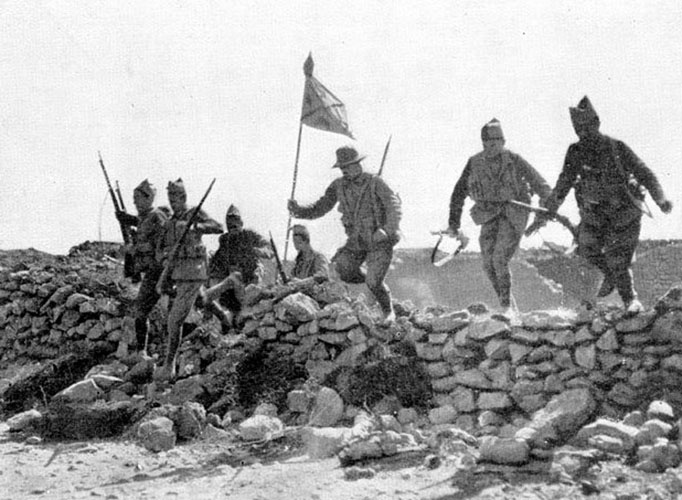Silvestre’s Last Stand
Alan’s TTIM Stories #58
“Pride goes before destruction, a haughty spirit before the fall.” Proverbs 16:18
Contemporaries described Spanish soldier, Manuel Fernandez Silvestre, as brave, reckless, and a womanizer. He suffered from the personality disorder of hubris – the lack of self-awareness leading to dangerous arrogance. It’s easy to compare those traits to an American equivalent, Lieutenant Colonel George Armstrong Custer, with the same tragic end.
Silvestre came from a military family and proved his tenacity as a soldier in the Spanish-American War, receiving 16 wounds while stationed in Cuba. The worldwide Spanish Empire was reduced during the 19th century to a few remaining territories including a foothold on the coast of Morocco, across from the Straits of Gibraltar.
The people of Morocco resisted Spanish authority. Silvestre, now a general, was stationed at Mililla in 1904 with a mission to put down numerous rebellions. He led a campaign against brigand Mulai Ahmed er Raisuni of the Perdicaris Incident fame (Alan’s TTIM Stories – Movie Review The Wind and the Lion). A victory at the Battle of Fondak Pass gave Silvestre overconfidence in his military abilities and the belief in the readiness of his troops, along with a low opinion of his adversaries.
A new opponent emerged in the desert mountains of the Rif. Abd el-Krim led highly motivated and skilled troops in the Rif War of 1921.
Spanish troops included many conscripts and reservists – poor quality, poorly trained, and poorly equipped. Rumors spread of soldiers exchanging military equipment for fresh vegetables. The lack of map reading skills led to many wandering excursions through the brutal desert. Troops and officers had something in common – no one wanted to be there.
Strength of the Spanish military was limited along the coast depending on access to the Spanish navy. Strength of the Riffians lay in the inland mountains. Every trip into the mountains was dangerous, not advised.
Silvestre believed the Spanish could take control of northern Morocco with posts throughout the land. Outposts in the desert were poorly supplied and vulnerable to attack. Attempts to resupply the posts were often destroyed.
Silvestre was determined to control the territory with foolish campaigns deep into the Rif. Warnings not to cross the Amekran River went unheeded. The attack on the outpost at Igueriben left only 33 survivors from a garrison of 300.
Krim moved on the Spanish Army at Annual. Believed to be outnumbered, Silvestre ordered a retreat of 5,000 soldiers. The unorganized troops fled with disastrous results. Thousands of soldiers were slain – one of the worst defeats in Spanish army history. The massacre included most the garrison along with in-camp prostitutes.
Silvestre stood in a place to observe the total destruction of his army. He retreated into his tent.
A bullet ended his life – not sure whether it was a stray bullet or suicide.
Currently, Spain maintains control of Northern African territory of Centa and Melilla along the coast with no interest to discuss sovereignty with Morocco. Latest developments include fence building to discourage immigration.
Colonization gives us stories of power and oppression, unfortunately not limited to past history. It also gives us insight into leaders with misguided motivations and personality disorders as unheeded warnings for today.

Sources:
Wikipedia
Bible
Army University Press
2017 Television series:
“Morocco: Love in Times of War”
Photo is licensed under the Creative Commons Attribution-Share Alike 4.0 International.
____________
Follow announcements of Alan’s TTIM Stories at Facebook.com/alan.vandervoort or Instagram & Threads vandervoort_author, with all available posts at www.alanvandervoort.com. Novels by the author include: Sandhills – A Novel and Key Largo Summer, found at Booklocker.com and other online booksellers.
Leave a Reply